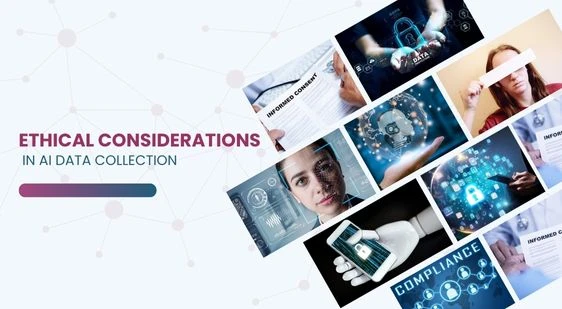As artificial intelligence (AI) continues to penetrate various industries, ethical concerns surrounding data collection are growing more urgent. Data forms the foundation of AI systems, but how it is collected, used, and managed directly impacts privacy, security, and fairness. Developers must carefully balance the need for high-quality data with their responsibility to protect users’ rights. This blog explores the central ethical issues in AI data collection—such as informed consent, privacy, bias, and accountability—alongside best practices for ethical compliance.
Informed Consent
To build trust and avoid deceptive practices, users must fully understand how their data will be collected, used, and stored. It is essential to clearly communicate this information, including details about data sharing and the duration of storage.
User-Friendly Consent Forms
Consent forms should always be straightforward, avoiding complicated legal jargon. Users need to clearly understand what they are agreeing to. Additionally, offering flexible consent options at various stages helps ensure that users make informed choices.
Opt-In/Opt-Out Choices
Providing users with clear choices regarding whether or not to share their data is crucial. This becomes even more important when sensitive information, such as health or location data, is involved. Giving users the ability to opt in or out reinforces their control over personal data.
Informed consent empowers users to make conscious decisions about their data, ensuring their autonomy and promoting ethical practices.
Data Privacy & De-Identification
After data collection, safeguarding user privacy should be a top priority. One effective way to do this is through de-identification, which anonymizes the data while still allowing it to be useful for AI development.
Effective De-Identification
De-identification methods remove personal details, such as names and addresses, from datasets. Advanced techniques, like differential privacy, go even further by adding noise to obscure identities while preserving the usefulness of the data.
Re-Identification Risk
However, even when data is anonymized, there is a risk of re-identification if the dataset is large or combined with other data sources. This risk is particularly significant in fields like healthcare and finance, where personal data is highly sensitive.
Balancing Privacy and Utility
It is vital to strike a balance between preserving privacy and maintaining data utility. While this can be challenging, it is necessary to ensure ethical AI development that protects user data without compromising model performance.
Mitigating Bias in Data Collection
Bias in AI data collection is a significant ethical concern, as it can lead to unfair outcomes and perpetuate existing societal inequalities. When AI models are trained on biased data, they replicate and even amplify those biases.
Sources of Bias
Bias can enter the system in various ways, such as through underrepresentation of certain groups or biased data labeling. For example, a hiring algorithm trained on data from a male-dominated industry may unfairly favor male candidates, perpetuating gender inequality.
Addressing Bias
To counteract bias, developers must ensure that data is collected from diverse sources and that all groups are adequately represented. Bias detection tools can help identify and correct imbalances during model training, leading to more equitable outcomes.
Impact of Biased AI
Biased AI can have serious consequences, especially in critical areas like hiring, law enforcement, and healthcare. By mitigating bias, developers can create more fair and ethical AI systems.
Accountability in Data Use
Ethical data collection doesn’t end with data acquisition. Developers and organizations must also take responsibility for how the data is processed, managed, and used throughout the AI lifecycle.
Clear Data Management Protocols
Organizations should establish clear protocols for data handling, including storage requirements, security measures, and ownership rights. Regular audits help ensure that these protocols are being followed and that data is used ethically.
Responding to Breaches
In the event of a data breach, organizations must take immediate action. Having robust security measures and a well-defined incident response plan ensures that breaches are addressed promptly and effectively.
Ethical Oversight
Ethical review boards can help monitor data collection and usage to ensure that all processes remain transparent and accountable. Regular audits and public reports help build trust and ensure ongoing ethical compliance.
Best Practices for Ethical Data Collection
To promote ethical compliance in AI data collection, developers should follow these best practices:
- Conduct Regular Audits: Periodic reviews of data collection processes help identify potential ethical issues or biases, allowing developers to address them before they impact AI models.
- Ensure Regulatory Compliance: Familiarize yourself with and adhere to relevant data protection laws, such as GDPR and CCPA, which provide guidelines for ethical data processing.
- Establish Transparent Feedback Loops: Create systems that allow users to express concerns about how their data is being used. Offer options for users to withdraw consent or adjust their data-sharing preferences.
By following these best practices, developers can ensure transparency, fairness, and privacy in AI systems, resulting in more ethical and trustworthy technology.







